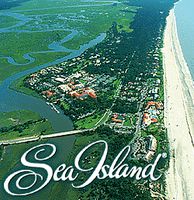TTAB Rules On Admissibility Of Electronic Evidence In Dismissal Of "SEA ISLAND" Oppositions
In dismissing oppositions based on Sections 2(d) and 2(e)(3), the Board issued several interesting evidentiary rulings in Sea Island Co. v. Kroehler Corp., Oppositions Nos. 91120712 and 91121447 (March 31, 2005) [not citable]. Opposer Sea Island, owner of the resort called "The Cloister" on Sea Island, Georgia, sought to block registration of Applicant's marks SEA ISLAND COLLECTION and AMERICAN SIGNATURE SEA ISLAND COLLECTION for furniture and furniture store services (now owned by American Signature, Inc.). The Board ruled on the admissibility of certain proffered Internet website pages, an entry from an encyclopedia on CD-ROM, radio transcripts downloaded from NEXIS, and copies of magazine pages bearing only handwritten notations regarding source.

Internet website pages: Opposer Sea Island moved to strike certain print-outs from Internet websites submitted by Applicant via a notice of reliance. Internet website excerpts are usually not admissible without proper authentication, and cannot be introduced into evidence by mere notice of reliance. Unlike "printed publications" under Rule 2.122(e), they are not self-authenticating. Applicant accompanied the print-outs with a declaration of its counsel, and argued that Raccioppi v. Apogee Inc., 47 USPQ2d 1368 (TTAB 1998) is applicable. However, as the Board pointed out, Raccioppi concerned evidence submitted on a summary judgment motion, not evidence submitted for final decision. Thus live testimony was required to authenicate these documents, not merely an affidavit. (Compare TBMP Sections 528.05(e) and 703.08)). The Board ruled in favor of Sea Island:
"Most excerpts from Internet websites differ from printed publications, which may be introduced by notice of reliance. Regardless of the ubiquitous nature of the Internet, most website excerpts are not analogous to printed publications because of the fact that the website is always subject to change, i.e., the subject matter of the website may not be the same the next time the website is accessed, whether it is ten minutes or ten days later, and there may be no indication thereon that it has been changed."
The Board noted that, if the Internet website mirrors a printed publication, excerpts therefrom "would be analogous to print publications and amenable to submission by notice of reliance."
CD-ROM encyclopedia entry: Sea Island also moved to strike an entry from the 2001 edition of the Microsoft Encarta Encyclopedia CD-ROM on the ground that the encyclopedia does not exist in print and therefore "is not the electronic equivalent of a printed publication."

This time, the Board sided with Applicant, ruling that this CD-ROM encyclopedia is self-authenticating:
"While a publication on CD-ROM is not a 'printed' publication because it may not also appear on paper, it may be self-authenticating if it is analogous to a printed publication by being an identifiable version of the publication that is only subject to change by the issuance of a new version that is identifiably different from the previous version (e.g., the 2000 edition of an encyclopedia versus the 2005 edition of the same encyclopedia)."
The CD-ROM encyclopedia also met the requirement of Rule 2.122(e) that it be "available to the general public." The Board noted Applicant's assertion that the Encarta encyclopedia is provided to consumers with every purchase of a Windows-based computer, and is available in libraries.
NEXIS radio transcripts: The Board likewise denied Sea Island's motion to strike certain radio transcripts downloaded from NEXIS, applying the same analysis as that applied to the CD-ROM encyclopedia.
"Both the nature of the exhibit, i.e., a transcript of an actual and identifiable radio broadcast, and the facts that it was broadcast to the general public, the transcript was made available to the general public, and it was obtained from a reliable database that is widely available to the public, lead us to conclude that it is self-authenticating and, thus, may be admitted in evidence by notice of reliance."
Hand-annotated magazine pages: Applicant moved to strike certain magazine articles and advertisements submitted with Sea Island's notice of reliance, on the ground that the materials were not properly authenticated: they contained no source-identifying information other than Sea Island's handwritten notations. The Board, however, agreed with Sea Island that "there is no requirement that a party submit such a printed publication with a copy of the cover page or other identification from the publication." The necessary authentication was provided by the description of each item in the notice of reliance and by the notations on the document.
* * * * * * * * * * * *
As to the substantive issues, the Board went through its standard du Pont analysis in finding no likelihood of confusion under Section 2(d), the most important factor being the lack of relatedness of the involved goods/services.

As to Section 2(e)(3), Sea Island claimed that Applicant's use of the term AMERICAN in the mark AMERICAN SIGNATURE SEA ISLAND COLLECTION caused the mark to be primarily geographically deceptively misdescriptive. The Board ruled that Sea Island's proofs were inadequate on three counts. Opposer failed to establish that AMERICAN would be understood as indicating a geographic origin: "It is equally likely that purchasers would understand the phrase AMERICAN SIGNATURE as indicative of a style of furniture." Secondly, there was inadequate proof that Applicant's use of AMERICAN is false, since its furniture is designed in the United States. And most importantly, "there is absolutely no evidence establishing the materiality of the geographic source of the goods or services to purchasers." See In re California Innovations, Inc., 66 USPQ2d 1853 (Fed. Cir. 2003) and In re Les Halles De Paris J.V., 67 USPQ2d 1539 (Fed. Cir. 2003).
Text ©John L. Welch 2005. All Rights Reserved.




0 Comments:
Post a Comment
<< Home